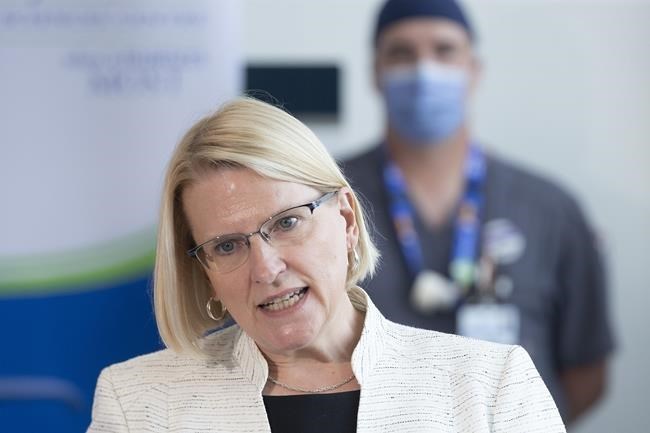TORONTO — The potential closure of six laboratories across the province would be dangerous and create inequity in northern Ontario, Public Health Ontario workers said Wednesday.
The workers are also worried about the proposal to get rid of the water testing program for private well owners across Ontario.
Last fall, the auditor general once again recommended the agency close six of its public health laboratories and eliminate the water testing program in an effort to cut costs.
Public Health Ontario first proposed the consolidation of its 11 laboratories in 2017, but the government has not acted.
Casey McGuire, a lab worker with Public Health Ontario, brought a petition to Queen's Park with more than 9,000 signatures of her colleagues and citizens concerned about the potential closures.
"Closing these public health labs will put communities at risk," she said. "The mission of Public Health Ontario is to enable informed decisions, get actions to protect and promote health and contribute to reducing health inequities."
McGuire and the union that represents the agency's lab workers, the Ontario Public Service Employees Union, are asking the government to reconsider the recommended closures.
"Closing Public Health Ontario labs would be a public disaster and lives will be at risk to meet demand and keep our community safe," McGuire said.
Labs in Timmins, Sault Ste. Marie, Orillia, Hamilton, Kingston, and Peterborough are on the chopping block, which could mean the loss of 82 jobs, said the union's president, J.P. Hornick.
"If the last few years have taught us anything, it is that public health should never be taken for granted," Hornick said.
"Like many choices made by this government, if Premier Ford decides to shutter the doors of these six labs, over half of the Public Health Ontario labs, it will be short sighted and dangerous. He is creating a crisis where there is none."
Health Minister Sylvia Jones said the province has not made a decision on the future of the well-water testing program, but refused to say whether or not it will close any labs.
"Let me be as clear as I can possibly be: There is no one in the province of Ontario or in this legislature who believes that putting well-water testing at risk is on the table," Jones said during question period.
She said the ministry "has not made any decisions about changes to the provincial well water testing program, including which laboratories conduct testing of water samples."
Jones, who said there are thousands of private wells across the province, stressed the tests remain available and that no changes have been made.
Last year, the Office of the Auditor General of Ontario conducted a value-for-money audit of Public Health Ontario, a government agency that is accountable to the health minister.
In 2017, Public Health Ontario along with the ministry proposed a modernization plan for the agency that included the consolidation of labs, a reduction in the type of tests conducted and gradually doing away with its private water testing program.
"According to the agency, this plan was needed to mitigate rising costs of repairs and upgrades in existing laboratory sites, and would result in a more efficient operating model to address issues such as sites needing to reroute the majority of samples and specimens they receive to other sites," the auditor general's report noted.
It said some of the labs rerouted the vast majority of test samples to other labs for testing.
"Three laboratory sites — Peterborough, Sault Ste. Marie and Sudbury — transferred between 80 per cent and 91 per cent of all tests to other sites," the auditor wrote.
In 2023, the agency presented an updated modernization plan to the ministry with the same consolidation plan along with the elimination of the water testing program, the auditor general said.
The auditor general recommended in December that Public Health Ontario work with the ministry to update and implement a plan within a year "to streamline public health laboratory operations."
The agency accepted the recommendation.
Several municipalities and local boards of health have raised concerns about the possible closures.
Sault Ste. Marie city council passed a resolution in February for the mayor to advocate against the auditor general's recommendations to close the labs.
The resolution said the closures would lead to "a significant loss of public health expertise in Sault Ste. Marie and northern Ontario ... at a time where public health expertise has proven to be a critical asset in assisting with the many public health challenges."
The Kingston, Frontenac, Lennox and Addington Board of Health passed a motion in February to oppose the possible closure of the lab in Kingston, Ont.
Those concerns should not be ignored, said New Democrat Jamie West, who represents the riding of Sudbury.
"We cannot afford to close down more than half of our public labs and believe that everything would be OK," he said.
This report by The Canadian Press was first published April 17, 2024.
Liam Casey, The Canadian Press




